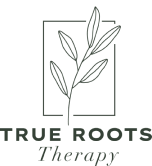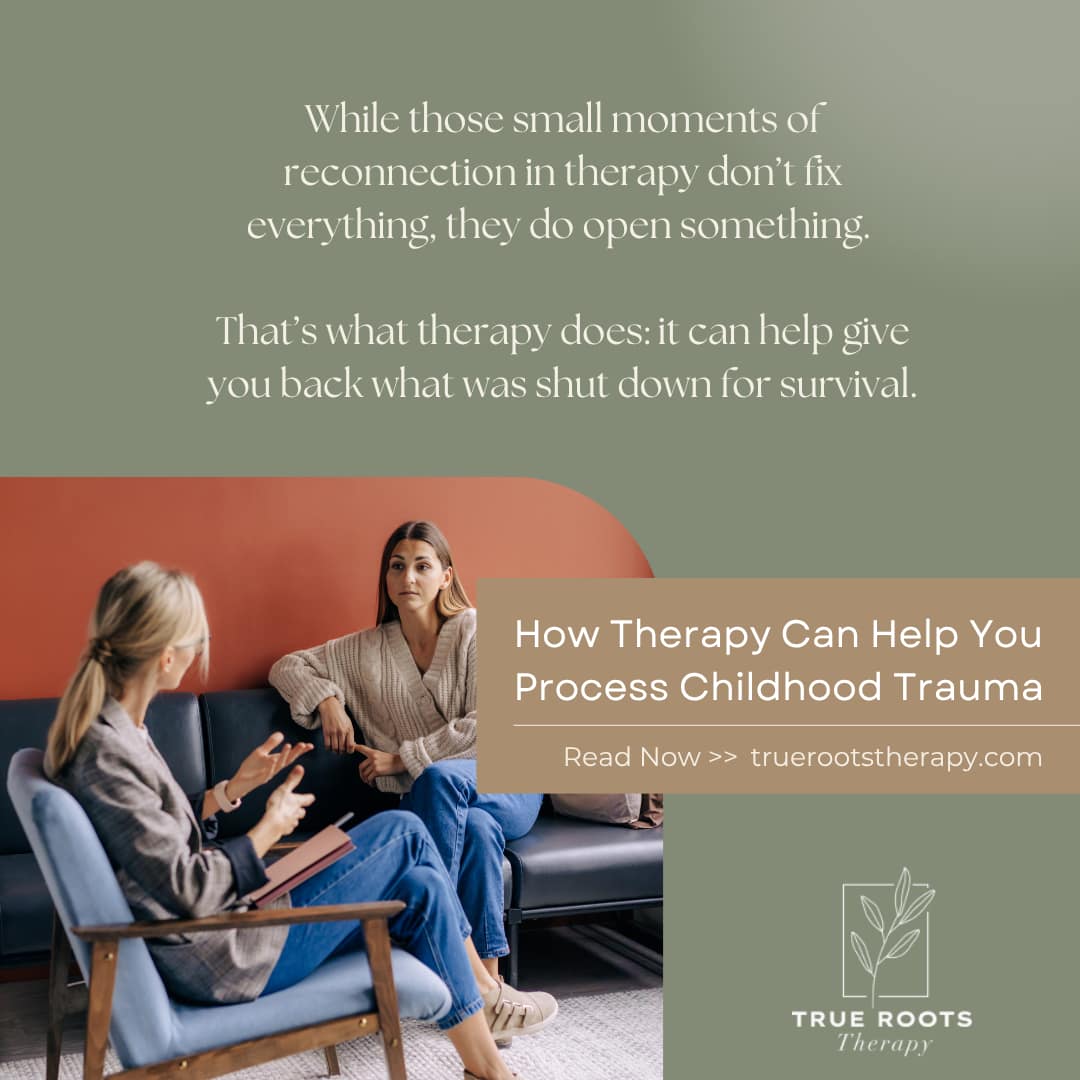 By Alyssa Haim, Registered Psychotherapist (RP), Canadian Certified Counsellor (CCC) | True Roots Therapy
By Alyssa Haim, Registered Psychotherapist (RP), Canadian Certified Counsellor (CCC) | True Roots Therapy
Childhood is meant to be a time of safety, connection, and growth, but for many, there are memories and events that impact us more than we think. When those early years are marked by trauma, the wounds don’t just fade with time. They settle in the body, the nervous system, and the sense of self. If you’re someone carrying pain from childhood, it’s common to have years spent trying to outgrow it, suppress it, or convince yourself that “it wasn’t that bad.” But healing begins when we stop minimizing and start gently unpacking the impact.
This is where therapy can help.
A Story So Many Carry
Let’s use a hypothetical case that I’m sure many can relate to. This person is a successful professional in their 30s, known for being composed and capable. But underneath a calm exterior, they are always bracing for something to go wrong. They might experience trouble sleeping. Certain smells or tones of voice can trigger a deep unease. Maybe they avoid conflict like the plague, even in relationships that are safe.
In therapy, we can slowly unpack why. This person grew up in a home with a parent who had unpredictable moods, in one moment loving, in the next, cruel. As a child, they learned to stay small, stay quiet, and stay good in order to stay safe. Their nervous system had learned to scan for danger, and their body carried that readiness (called hypervigilance) into adulthood, long after the threat had passed.
What Childhood Trauma Can Look Like
Childhood trauma can take on many forms. It can include:
- Emotional neglect or abandonment
- Physical or sexual abuse
- Witnessing domestic violence
- Growing up with a parent who struggled with addiction or mental illness
- Being shamed, silenced, or consistently misunderstood
- Bullying or cultural/familial oppression
These experiences can shape a child’s developing brain and worldview. You may have learned not to trust others or yourself. You may have developed people-pleasing behaviours to avoid conflict. You may struggle with self-worth, even if you’re outwardly successful.
The result? Adult relationships that feel confusing or unsafe. An inner critic that never shuts off. Emotions that feel too big, or numbness that makes it hard to feel anything at all.
Why You Can’t Just “Get Over It”
Many people don’t seek therapy for childhood trauma until much later in life. That’s often because they were told to “move on,” or believed their trauma “wasn’t bad enough.” Maybe you’ve heard yourself say things like:
- “Other people had it worse.”
- “It happened so long ago.”
- “I should be over this by now.”
But trauma is not measured by the event itself – it’s measured by the impact it had on your nervous system, your safety, and your ability to be yourself. If something still hurts, still shapes how you see the world or yourself, it matters.
How Therapy Helps
Therapy creates a space where your story is heard, and not minimized or rushed. Here’s how it can support your healing:
1. Making the Invisible Visible
In therapy, you begin to name what happened, not just intellectually, but emotionally. Many clients are surprised to discover just how much they’ve been carrying. Through gentle reflection, you begin to notice patterns, such as why certain triggers appear, how you protect yourself, and where your needs have gone unmet.
2. Reclaiming the Body
Childhood trauma doesn’t just live in the mind; it lives in the body. You may carry tension in your shoulders, experience chronic pain, or feel disconnected from your physical self. Trauma-informed therapy, especially modalities like EMDR or somatic experiencing, helps you process trauma without needing to retell every detail. These approaches can help you to reconnect and feel safe in your body again.
3. Rebuilding Trust in Relationships
Trauma often leaves us feeling like we can’t rely on others. Therapy itself becomes a model for healthy attachment: a relationship based on safety, respect, and consistency. Through the therapeutic bond, you begin to experience what it’s like to be seen, heard, and cared for without judgment or an agenda.
4. Changing the Inner Narrative
If you grew up with criticism, silence, or blame, your inner voice might be harsh. Therapy helps you reframe that narrative, allowing you to move from “I’m broken” to “I adapted the best I could.” That shift is powerful. It replaces shame with self-compassion and fear with curiosity.
Reconnecting
Let’s talk about another common and relatable experience of how childhood trauma can impact our lives as adults. Many adult survivors of childhood trauma can come to therapy feeling emotionally flat. In therapy, we can start to connect with memories of growing up in an environment where feelings weren’t safe. Therapy provides a space for you to start to feel again. While those small moments of reconnection in therapy don’t fix everything, they do open something. That’s what therapy does: it can help give you back what was shut down for survival.
You Deserve to Heal
You don’t have to keep carrying the weight of your trauma. Therapy is not about blaming your parents or living in the past. It’s about making sense of what happened so you can stop reliving it in the present. It’s about giving yourself the care and attention you may have never received but deeply deserved.
Processing childhood trauma isn’t easy. But you don’t have to do it alone.
If You’re Feeling Stuck, Let’s Talk
If any part of this resonates with you, if you’re tired of struggling with your thoughts or emotions and you’re longing to feel more like yourself again, I invite you to reach out.
As a Registered Psychotherapist and Canadian Certified Counsellor, I offer evidence-based, compassionate therapy that meets you where you are and helps you grow into where you want to be. Together, we can explore how ACT or other approaches may support you in creating the life you want, one step at a time.
You don’t have to do it all at once. You just have to begin.
🗓️ Book your free 20-minute consultation today and learn more about how ACT can support your journey.
You’re not broken, you’re just human. Let’s work together to help you live like it.

